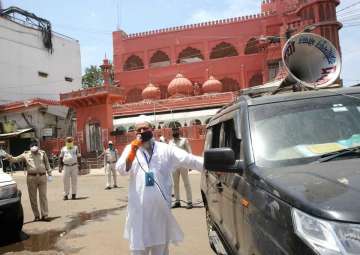While the religious leaders in Pakistan have forced the government into keeping the mosques open during the holy month of Ramadan, as part of a 20-point action plan, Indian Muslims have wholeheartedly backed the Centre's decision to shut down the places of worship in the most crucial month in the Islamic calendar.
A primary reason offered by religious heads in the neighbouring country behind the demand was the effect a lockdown would have on their earnings, as Muslims around the world are known to loosen their purse strings during Ramadan. Toeing the line, Pakistan President Arif Alvi, after a meeting with the religious heads on April 18, called upon his countrymen to donate generously at mosques.
Analysts believe that the religious heads, deeply involved in the functioning of the state machinery in Pakistan, don't want to lose their influence over the masses, which reduced contributions that would accompany locking down of mosques, would entail. Worryingly, there have been news reports fearing that mosques in Pakistan are emerging a significant source for the spread of coronavirus, as a docile government buckled to pressure from the powerful religious institutions.
But Indian Muslims, constituting approximately 20 per cent of the country's 1.3 billion population, echo Prime Minister Narendra Modi's slogan 'jaan hai to jahaan hai.'
Niaz Farooqui, Secretary at the Jamiat Ulama-i-Hind, said that the closing down of mosques during Ramadan is an essential step towards flattening the coronavirus curve in India. "Even though the donations during Ramadan will be affected, we will try to overcome the crunch once the mosques re-open and the situation gets back to normal," said Farooqui.
"The earnings at the mosque are definitely being impacted due to the lockdown. But people have alternative avenues, including charity outfits and online contributions, through which they could fulfil the mandatory obligation of Zakat," said the religious scholar, adding that zakat was as important in Islamic teachings as praying five times a day.
The JuH leader explained that donations into the Zakat fund at mosques are sourced towards many charitable deeds, which in turn help many beggars and the needy. "Mosque-goers are duty-bound to donate in Zakat after the congregation prayers," Farooqui highlighted.
As part of their religious duty, Muslims must contribute 2.5 per cent of their annual income towards charity, a process that picks pace during Ramadan. A Muslim who has more than seven tolas (70 grams) of gold has an obligation to donate a part of his gold, said Faaroqui.
One of the organisations working with the poor, mostly migrant workers hit by lockdown, during Ramadan, Students Islamic Organisation (SIO) of India, agrees. "Zakat is another pillar of Islam and is meant only for the poor and the needy," said Syed Azharuddin, the general secretary of the youth outfit.
He said that his organisation had also called upon its supporters to "give Zakat for uplifting the migrant workers and small-scale businesses which have been most severely hit by the lockdown."
Prominent religious outfits in India, including JuH, the leading organisations of Islamic scholars in India, have called upon the community members to stay and pray indoors to check the spread of coronavirus infections.
Jama Masjid's Shahi Imam, Syed Ahmed Bukhari, at the start of the Islamic month, even warned the community that inviting the neighbours over to pray together wasn't acceptable.
Also read: Hyderabad gears up for low-key Ramadan amid COVID-19 lockdown
Latest India News
